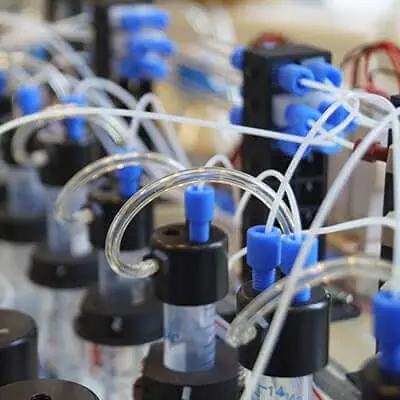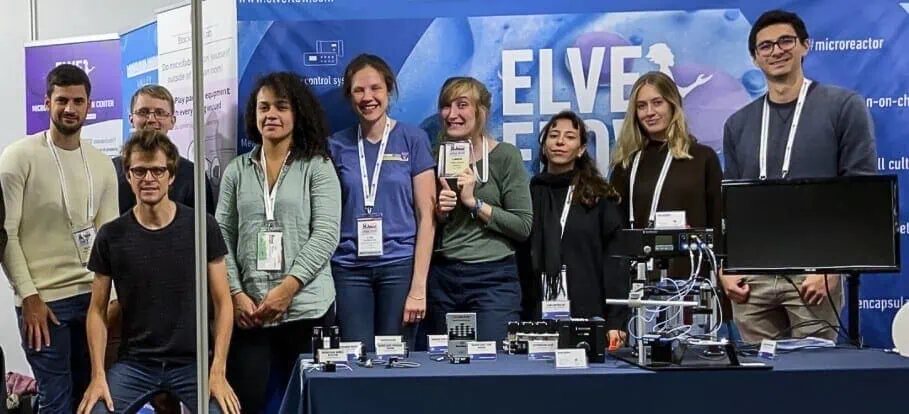How to find an industrial partner for your Horizon Europe project?
Tips for finding an industrial partner
It can be challenging for academic researchers to find and convince the right industrial partner as they build a Horizon Europe project. This can be due to many things:
- Most SMEs and large companies deal with different professional networks than academic researchers. Finding the right contact point can be challenging.
- Companies are not academic labs! Industrial companies mainly focus on business opportunities rather than offering new scientific discoveries to humanity. Our job is to innovate, which is different from making scientific discoveries.

- Most companies do not understand the Horizon Europe grant application process compared to academics. Often, they even get stuck in the Horizon Europe administrative labyrinth.
- Many companies may assume that working with academics isn’t efficient. Some key aspects, such as publication-oriented goals, can be seen as incompatible with a patent-oriented strategy.
Should we renounce to build a strong and successful European consortium? Not!
Today, the EU generally requires you to integrate one or several industrial partners into your Horizon Europe consortium. This is an additional opportunity to boost the project’s proposal score and improve your chances of getting the grant.
This page aims to give you everything you need to quickly identify and integrate industrial partners into your consortium. Based on our experience over the past decade, we learned how to be ideal partners… before starting a project!
Why the European Union wants you to integrate industrial partners and SMEs into your Horizon Europe project
It is essential to understand why the EU requires the integration of industrial partners.
Industrial partners can add value, but only when they are correctly integrated into your project! You will not get the grant if you give your industrial partner an inadequate role.
The European Union wants you to integrate companies into your Horizon Europe grant proposal for the following reasons:
SMEs can bring an entrepreneurial mindset to your Horizon Europe project consortium
When you integrate an SME into your Horizon Europe consortium, there is a good chance that the entrepreneur will alert you whenever something that can be valorized comes up. Industrial partners are not there for the basic science – their job is to innovate, which means exploiting an idea and making it come to life.
Our missions perfectly match the goals of the European Union: as academics, you produce the gold, and as SMEs, we dig to find how to exploit it until we understand how to make jewels.
Industrial partners will always refocus the project towards profitable market outcomes
Did you know that a significant conclusion of the H2020 framework program was double-edged?
While the success of scientific outputs could easily be measured by publications and a much stronger worldwide competitiveness, the EU Commission also observed that few of these outputs had been pushed into society. This is why, in the Horizon Europe program, Innovative Europe is one of the three pillars, and many new funding schemes are put in place to encourage the actual transfer of the research outcomes into society.
Everybody wins when your research is turned into a product and, why not, has chances to save lives! From the EU citizens through the economic and societal impact of the project to the partners’ (both universities and companies) return on investment, including the research team’s notoriety.
The industrial partner can be the valorization partner of your Horizon Europe project
Usually, the SME or bigger company in your consortium will be an excellent candidate to take care of the valorization aspects of any exploitable consortium results. This is an essential feature for the EU to ensure that the money invested into Horizon Europe turns into economic activity and that a correct Intellectual Property strategy will be applied (e.g., patenting before publishing).
Industrial partners are good at engineering
First, industrial partners are not well fitted to essential research work.
We can provide a long list of reasons, the main one being that since companies need profits, we have a different timeline and pursue short-term deadlines to achieve our long-term strategies.
However, private sector methods can work wonders in engineering to provide functioning, industrialized systems.

Companies are well fitted to take care of industrialization
“Industrialization”. Here is a crucial aspect of a company’s role inside a consortium.
As companies think about how they could valorize a technology, they must ensure that early prototyping will be scalable. Regarding industrialization quality procedures, companies are generally the right partners.
Where can you find an industrial partner for your Horizon Europe consortium?
There are several methods to find industrial partners for your Horizon Europe consortium; some of them are very fast, and some are more exhaustive. Notably, some are more selective and enable you to target the proper skills or mindset you need for your project.
Specialized Horizon Europe websites for SMEs and industrial partner search
Large companies and SMEs putting up their profile on Horizon Europe partner search websites are generally more open to Horizon Europe collaboration. This is a good start.
In addition to the European Commission’s official portal, you will find below a list of beneficial websites to find the ideal partner profile for your specific consortium. Don’t forget to add your profile so other partners can contact you! Then, take the necessary time to browse the profiles of industrials in these databases and contact them directly.
A list of useful links to find European partners for your consortium
NMP TeAm: https://www.nmp-partnersearch.eu/index.php?index=60
Crowdhelix: https://www.crowdhelix.com/
Up2Europe: https://www.up2europe.eu/
Fir for Health: https://mm.fitforhealth.eu/
PNO Innovation Place: https://www.innovationplace.eu/
Senet Hub: https://www.senet-hub.eu/call-power-partnering/
Marie Curie Alumni Association: https://www.mariecuriealumni.eu/newsletter/10-websites-you-need-know-if-you%E2%80%99re-looking-research-partners

Tips and tricks: how to find your ideal partner?
Write a concise email (3-4 lines) to any company that may fit your project.
Write at least a dozen companies, not just 1-2! Please put them in competition and select those with the mindset, the goals, the tempo, and the skills that fit you the most.
Remember you will then work with them as partners within your research consortium. You don’t want to put a fox in the henhouse, do you? Eventually, we also want to enjoy working together!

Imagine all the keywords the company may write down to describe themselves.
This preliminary work is essential. As for a bibliography search, you don’t want to miss a query because of a bad boolean request with inappropriate keywords!
Use keywords referring to technical skills and applications/markets… and find as many synonyms as possible.

Contact industrials who have already worked on an H2020 or Horizon Europe project.
You can use your network or check European grant databases to find an industrial partner who already worked in your field and participated in European projects, like Cordis or Horizon Dashboard.
Use a search engine to find companies with the skills you need and LinkedIn to find the accurate contact point.
First, identify all the SMEs or big companies that fit your needs on a search engine. Second, go to Linkedin to identify individual researchers in their R&D team. LinkedIn is widely used in the industry, and getting contacted is common. Third, invite all of them to your LinkedIn account with a three-line email explaining that you are considering including them as partners for your next Horizon Europe consortium.
Use Google Scholar to find companies that publish in your field.
Directly contact the industrial researcher, who was a co-author in the published papers. You will have a greater chance to be in contact with someone more open to research with academic laboratories. Again, save time by using Linkedin!

Target industrial exhibitors at scientific conferences.
Scientific instrumentation companies, especially SMEs, are generally more open to Horizon Europe grants since they understand the world of research and do much research themselves.
How to contact SMEs and large companies?
Company website contact form: a big difference between SMEs and large companies
Researchers and CTOs don’t usually put up their email on the internet.
For SMEs, a short message through the company website’s contact page should be quickly and correctly routed and fruitful. For more prominent companies, however, there is a 99% chance that your message on the contact form will be lost before reaching the right person.
Linkedin: Highway to the right people
Use your network.
The easiest way to contact researchers from private R&D teams is through LinkedIn.
As we said before, you can identify companies with a search engine, then search for researchers working in the appropriate scientific department by combining keywords such as “company name + scientific keyword”).
Then, shoot an invitation to some of them with a straightforward message (“Hi Mr T, I am looking for partners with your expertise to submit a Horizon Europe proposal”). Be broad and be bold! And follow up with answers you find positive, proactive, quick…

Do you know former academic researchers who decided to join an industrial company? Then, contact them; they will better understand your needs and share your mindset. They can become the best contact point to forward your request inside the company.
How to understand, reassure and motivate industrial partners to join your Horizon Europe consortium?
When you are in contact with an industrial partner, the difficulty is understanding their mindset and making them understand why joining your Horizon Europe consortium is a good thing.
As we said, companies may be suspicious regarding academic consortia. They are business-oriented, and as you would not deviate from your scientific objective, they would not lose their strategic focus. They also hold concerns about confidentiality and the risk of losing control over their results.
However, there are answers to give. Answers to let them understand they have a lot to win from this!

What company can benefit from by joining your Horizon Europe project consortium
- They may be the best partner to valorize and exploit the results. This is good for business.
- They can get prime access to great discoveries (yours) before they become public. This is how deep tech arises.
- They get EU funding for their R&D, so the financial risk is minimal. This argument is powerful for SMEs.
- If you can show them that the project’s outcome can give them a competitive advantage in their market… you’ve won!
- They can strengthen their networks, both with academics and other industrial partners. This is hard for industrials, too!
- Even if there is no business outcome, people in private companies are also keen on working on something great for humanity. This is good for their external communication.
How to reassure your future industrial partner
- Focus and delays – Companies fear that academics may not deliver on time and may take different directions from their focus. Ideally, most of the technical work done by the industrial team in the Horizon Europe project should benefit its business, independent of the results of the other consortium members.
- Confidentiality – Inform them that the EU for Horizon Europe project proposal grant agreement template already includes very restrictive confidentiality clauses.
- Patents and intellectual property – Remind them that the EU grant agreement template for Horizon Europe proposals already includes an IP clause where any results from a partner belong to this partner and that shared results will become shared patents.
How to reassure a private company?
Remember: the person in front of you doesn’t necessarily have the power to make a decision. Look up the company’s structure. Who decides? Anticipate delays in getting approval and signatures (particularly with large companies).
Small companies (SMEs) are much faster at deciding to join your consortium than big entities. Small companies can make decisions within days and weeks, big ones within months and sometimes years.
Based on our experience, the best way to build a winning consortium would be to include both an SME and a big group in the grant proposal. Why? Mainly because SMEs can bring a fast rhythm, quickly handle challenging engineering tasks, and are interested in small-sided product valorization.
Big companies will gain a deep strategic market vision, can valorize projects in bigger/regulated markets, and handle even more sophisticated projects.
The MIC and Horizon Europe
We will be glad to participate in your project. Visit our dedicated webpage to learn more about our expertise as H2020 and Horizon Europe partner!
Curious about the calls currently open?
We are particularly interested in the following calls but remain open to any collaboration!
- EIC Work Programme that supports all stages from R&D to industry for game-changing innovations
- Horizon Europe RIA Calls specifically focusing on health and food, bio-economy, natural resources, agriculture, and environment